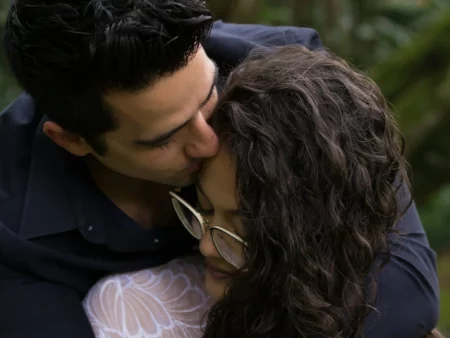Stepping into the dating world can feel like navigating a minefield. Rejection, judgment, and vulnerability often hold people back from exploring meaningful connections. Yet, what if we could transform this anxiety into an opportunity for personal growth?
This guide aims to illuminate the root causes of dating apprehension and provide practical strategies to build confidence, foster genuine connections, and embrace the journey of love. Whether you’re shy, introverted, or simply cautious, we’ll explore techniques to help you overcome hesitation and connect authentically.
From cognitive-behavioral approaches to mindfulness practices, we’ll equip you with tools to manage dating-related stress and cultivate inner peace. Let’s embark on this transformative path, turning fear into an exciting adventure of self-discovery.

Understanding the Root Causes of Dating Anxiety
Unraveling the complex tapestry of dating apprehension reveals a myriad of underlying factors that contribute to this common struggle. Understanding these root causes is crucial for those seeking to embrace meaningful connections. Let’s explore the key elements that often fuel this insecurity:
- Echoes of Past Experiences: Negative encounters or heartbreaks can cast long shadows, making individuals reluctant to open themselves up to potential hurt again.
- Self-Worth Hurdles: Low self-esteem can lead to persistent doubt about being “good enough” for a partner, causing individuals to hesitate before putting themselves out there.
- Societal Pressure Cooker: Cultural norms and family expectations around relationships can create an overwhelming sense of obligation, leading some to retreat from dating altogether.
- Fear of the Unknown: The uncertain nature of new relationships can trigger nervous feelings, causing people to overthink every interaction and avoid taking emotional risks.
- Vulnerability Aversion: Opening up emotionally can feel like a monumental task for those who are guarded, making it challenging to establish genuine intimacy and trust.
- Fear of Failure: The possibility of a relationship not working out can paralyze some individuals, causing them to resist entering the dating scene.
These factors often intertwine, creating a complex web of emotions that can leave individuals feeling overwhelmed and insecure in the face of potential romantic encounters. By recognizing these underlying causes, those afraid of dating can begin to address their concerns and grow beyond their limitations. It’s important to remember that overcoming these hurdles is a journey, not a destination, and each small step forward is a reason to celebrate. As clients work through these challenges, they often find increased comfort in their dating life.
Building Self-Confidence: The Foundation of Successful Dating
At the core of successful dating lies a foundation of self-confidence. This inner strength not only attracts potential partners but also empowers individuals to navigate the complexities of romantic interactions. Building self-assurance is a journey that requires patience and practice, but the rewards are immeasurable.
To boost your self-esteem, start by acknowledging your unique qualities and accomplishments. Create a list of your strengths and revisit it regularly. Engage in activities that make you feel capable and accomplished, whether it’s mastering a new skill or excelling in your career. Remember, genuine confidence stems from self-acceptance and personal growth.
Challenging negative self-talk is crucial in overcoming dating worry. When you catch yourself thinking “I’m not good enough” or “No one will like me,” pause and reframe these thoughts. Ask yourself, “Is this thought based on facts or assumptions?” Replace doubt with positive affirmations that reflect your true worth.
Confidence in dating isn’t about being perfect; it’s about embracing your authentic self and recognizing the value you bring to a potential relationship. By focusing on personal growth and self-acceptance, you create a strong foundation for meaningful connections.
Taking risks in social situations can help build dating confidence. Start small by initiating conversations with strangers or asking a friend to set you up. Each interaction, regardless of the outcome, is an opportunity for growth and learning.
For individuals struggling with self-assurance, therapists often recommend practicing self-compassion. Treat yourself kindly. This approach can help alleviate the fear of failure and foster a more positive self-image.
Remember, building confidence is a gradual process. As you become more comfortable with yourself, you’ll find increased ease in dating situations. Embrace the journey, celebrate small victories, and watch as your social interactions transform, one confident step at a time.
The Gradual Approach: Taking Small Steps Towards Dating Comfort
Embarking on the dating journey can feel daunting, but a gradual approach can transform it into an exciting adventure. By taking small, manageable steps, you can build comfort and confidence in social situations. Let’s explore a progression that eases you into the world of romantic connections:
| Stage | Activity | Purpose |
|---|---|---|
| 1. Micro-Interactions | Ask for directions or time | Build basic social skills |
| 2. Brief Exchanges | Compliment a stranger | Practice positive interactions |
| 3. Extended Conversations | Chat with a barista | Improve small talk abilities |
| 4. Group Settings | Join a hobby club | Reduce pressure in social environments |
| 5. Casual Meetups | Coffee with a potential interest | Experience low-stakes date scenarios |
| 6. One-on-One Dates | Dinner or activity date | Engage in deeper connections |
Remember, it’s natural to feel nervous as you progress. Each step forward is a victory, no matter how small. As you practice, you’ll find your anxiety diminishing and your social skills flourishing. Challenge yourself to take calculated risks. Perhaps strike up a conversation with someone new at a friend’s gathering. These moments of courage build resilience and self-assurance.
If you find yourself wanting to resist moving forward, pause and reflect on your progress. Celebrate how far you’ve come and visualize the meaningful connections awaiting you. Consider keeping a journal to track your journey, noting small successes and areas for improvement. This self-reflection can provide valuable insights and boost your motivation.
To further enhance your comfort level, practice role-playing scenarios with a trusted friend or family member. This simulated experience can help you feel more prepared and confident in real-world situations. Additionally, focus on developing your active listening skills, as being genuinely interested in others can alleviate self-consciousness and foster authentic connections.
By embracing this step-by-step method, you’re not just preparing for dates; you’re cultivating valuable life skills. Each interaction becomes an opportunity for growth, leading you closer to authentic and fulfilling relationships. Remember, the goal is progress, not perfection. Embrace the journey, and watch as your confidence blossoms with each new experience.
Cognitive-Behavioral Techniques for Managing Dating Anxiety
Cognitive-behavioral techniques offer powerful tools for managing dating anxiety, empowering individuals to reshape their thought patterns and behaviors. By implementing these strategies, you can cultivate a more positive mindset and approach dating with renewed comfort and confidence.
- Thought Record Keeping: Maintain a journal to document anxious thoughts, challenging their validity and identifying cognitive distortions.
- Cognitive Restructuring: Replace negative self-talk with balanced, realistic assessments of dating situations.
- Behavioral Experiments: Gradually expose yourself to dating scenarios, testing anxious predictions against actual outcomes.
- Mindfulness Integration: Incorporate present-moment awareness techniques to reduce anticipatory anxiety before dates.
- Positive Self-Affirmations: Develop and regularly practice self-affirming statements to boost self-esteem and dating confidence.
- Imagery Rehearsal: Visualize successful dating experiences to build mental resilience and reduce anxiety.
- Socratic Questioning: Challenge irrational beliefs by asking yourself probing questions about their validity and evidence.
- Exposure Hierarchy: Create a list of anxiety-inducing dating situations, ranking them from least to most challenging, and gradually work through them.
- Relaxation Techniques: Learn and practice deep breathing, progressive muscle relaxation, or guided imagery to manage physical symptoms of anxiety.
- Social Skills Training: Enhance your ability to initiate and maintain conversations, read social cues, and express yourself effectively in dating contexts.
Remember, implementing these techniques requires consistent practice and patience. As you progress, you’ll develop a toolkit for managing dating-related stress and anxiety. Consider working with a therapist specializing in cognitive-behavioral therapy to tailor these strategies to your unique needs and experiences.
By embracing these cognitive-behavioral approaches, you’re taking a proactive step towards transforming your dating experience. Each small victory in managing anxiety builds momentum, encouraging you to take calculated risks and open yourself to meaningful connections. With time and practice, you’ll find yourself navigating the dating world with increased ease and confidence, ready to embrace new opportunities for personal growth and relationship development.
Mindfulness and Relaxation: Calming Techniques for Dating Scenarios
Harnessing mindfulness and relaxation techniques can significantly alleviate dating-related stress, offering a sanctuary of calm amidst the emotional whirlwind of romantic encounters. By cultivating present-moment awareness, individuals can effectively manage anxiety symptoms and approach dating scenarios with greater equanimity.
One effective exercise is the “5-4-3-2-1” grounding technique. Before a date, identify five things you can see, four you can touch, three you can hear, two you can smell, and one you can taste. This simple practice anchors you in the present, reducing anticipatory anxiety.
Diaphragmatic breathing is another valuable tool. Practice taking slow, deep breaths from your diaphragm, counting to four as you inhale and six as you exhale. This technique activates the parasympathetic nervous system, promoting a state of comfort.
Mindfulness in dating is not about perfecting each interaction, but about being fully present and accepting of the experience as it unfolds. It allows you to respond thoughtfully rather than react impulsively to social cues and conversation.
Progressive muscle relaxation can also be beneficial. Starting from your toes and working up to your head, tense each muscle group for five seconds before releasing. This method decreases physical tension and contributes to overall relaxation.
Remember, embracing these techniques is a form of self-care and personal growth. By taking this risk to prioritize your mental well-being, you’re not only preparing for better dating experiences but also cultivating a more balanced approach to life’s challenges.
Communication Skills: Expressing Yourself Confidently on Dates
Effective communication forms the bedrock of successful dating experiences. To express yourself confidently, start by practicing active listening. Give your date your full attention, maintaining eye contact and offering verbal cues to show engagement. This demonstrates genuine interest and helps you gather valuable information to fuel meaningful conversations.
When sharing about yourself, aim for a balance between openness and discretion. Offer personal anecdotes that reveal your values and passions, but avoid oversharing or dominating the conversation. Remember, a great date feels like a dance of give-and-take, with both parties contributing equally.
Body language speaks volumes in dating scenarios. Maintain an open posture by keeping your arms uncrossed and leaning slightly towards your date. Smile genuinely and use appropriate touch, such as a light brush on the arm, to establish comfort and connection when the moment feels right.
Setting boundaries is crucial for healthy interactions. Clearly communicate your preferences and limits with confidence and respect. For instance, if you’re not ready for physical intimacy, express this calmly and directly. A simple “I’m enjoying getting to know you, but I prefer to take things slowly” can set the tone for mutual respect.

Practice authenticity in your communication. Avoid putting on a facade or pretending to be someone you’re not. Genuine self-expression not only builds trust but also attracts compatible partners who appreciate you for who you truly are. Remember, effective communication is a skill that improves with practice. Each date is an opportunity to refine your abilities and learn more about yourself and others.
Changing Your Mindset: From Fear to Opportunity
Shifting your perspective on dating can transform it from a source of anxiety into a pathway for personal growth and meaningful connections. By reframing your mindset, you open yourself to a world of possibilities and self-discovery. Instead of viewing each date as a potential setback, consider it an opportunity to learn about yourself and others.
Challenge negative thoughts that arise before or during dating experiences. When you realize that you think, “This will be a disaster,” stop and ask, “But it may be enjoyable!” This simple shift can reduce anticipatory anxiety and allow you to approach dates with curiosity rather than apprehension.
Embrace the idea that every interaction contributes to your personal development. Each date offers a chance to practice social skills, explore new perspectives, and refine your understanding of what you seek in a partner. By focusing on these growth opportunities, you’ll find value in every experience, regardless of the outcome.
Every date is a stepping stone on your journey to self-discovery. Embrace the adventure, for it is through these experiences that you’ll uncover the depths of your own character and the boundless potential for connection.
Remember, changing your mindset is a gradual process. Be patient with yourself as you learn to view dating through this new lens. With practice, you’ll find that what once caused unease now sparks excitement and anticipation. By embracing this shift, you’ll not only enhance your dating experiences but also cultivate a more positive outlook on life’s various challenges and opportunities.
Seeking Support: The Role of Friends, Family, and Professionals
Overcoming dating fears is not a solitary journey. A robust support system can provide invaluable encouragement, perspective, and guidance. Here’s how different sources of support can contribute to your progress:
- Trusted Friends: Offer a safe space to voice concerns and practice social skills through mock date scenarios. They can provide honest feedback and boost confidence.
- Family Members: Provide unconditional support and help build self-esteem through positive reinforcement. Their familiarity can offer comfort in times of uncertainty.
- Support Groups: Connect you with others facing similar challenges, fostering a sense of community and shared learning. These groups often provide practical tips and emotional solidarity.
- Mentors: Guide you through personal growth experiences and share wisdom from their own relationship journeys. Their perspective can help reframe dating challenges.
- Life Coaches: Assist in setting achievable goals and developing strategies to overcome specific dating obstacles. They can help create actionable plans for personal development.
- Therapists: Address underlying issues and provide tailored cognitive-behavioral techniques to manage anxiety. They offer professional insights into patterns affecting dating experiences.
Professional help, particularly therapy, can be transformative for those struggling with severe dating apprehension. Cognitive-behavioral therapy (CBT) is especially effective in challenging and reshaping negative thought patterns about dating. For individuals with OCD-related dating fears, Exposure and Response Prevention (ERP) therapy can provide targeted relief.
Remember, asking for support is not a sign of weakness but strength. It demonstrates your commitment to personal growth and readiness to embrace meaningful connections. By leveraging these resources, you’re equipping yourself with a diverse toolkit to navigate the complexities of dating with increased comfort and confidence. Each step taken with support brings you closer to fulfilling relationships and personal satisfaction.
Embracing Vulnerability: The Key to Authentic Connections
Embracing vulnerability is essential for building authentic connections in dating. By opening ourselves to emotional exposure, we create space for genuine intimacy and understanding. This act of courage allows us to shed superficial facades, fostering deeper relationships.
When approaching dating with openness and honesty, we invite our partners to reciprocate. This mutual vulnerability creates a foundation of trust, enabling both individuals to express their hopes, fears, and desires without judgment. Through these candid exchanges, true compatibility is discovered and nurtured.
However, vulnerability doesn’t mean oversharing or disregarding boundaries. It’s about finding a balance between authenticity and discretion, sharing aspects of ourselves thoughtfully as trust develops. This measured approach allows for a natural evolution of emotional intimacy.
True connection blossoms when we have the courage to be seen for who we are, imperfections and all. In our vulnerabilities, we find our greatest strength and capacity for connection.
Embracing vulnerability helps navigate dating challenges with greater resilience. By acknowledging our fears and insecurities, we address them head-on, fostering personal growth and emotional maturity. This self-awareness enhances our dating experiences and contributes to overall well-being.
As we learn to embrace vulnerability, we open doors to profound connections. Through authentic self-expression, we find partners who truly appreciate us, laying the groundwork for lasting relationships built on mutual understanding and genuine comfort.
Conclusion: Your Journey to Confident Dating Starts Now
As we conclude this journey through the intricacies of dating apprehension, remember that overcoming challenges is a gradual process, unique to each individual. The strategies we’ve explored – from cognitive restructuring to mindfulness practices – serve as powerful tools in your personal growth arsenal. Embracing openness and reframing obstacles as opportunities for self-discovery can transform your experiences.
Take heart in knowing that every step forward, no matter how small, is a victory. By implementing these techniques consistently, you’re not just preparing for encounters; you’re cultivating resilience and self-assurance that will enrich all aspects of your life. Remember, the goal isn’t perfection, but progress.
Your journey to confident interactions begins now. Embrace it with patience, self-compassion, and an open mind. As you navigate this path, you’ll uncover strengths you never knew you possessed and open doors to meaningful connections. Trust in your ability to grow, adapt, and find comfort in the beautiful uncertainty of new relationships.
Frequently Asked Questions About Overcoming Dating Fear
Can online dating help ease anxiety for those afraid of in-person dates?
Online dating can ease anxiety for those apprehensive about in-person encounters. It offers a controlled environment to interact at one's own pace, allowing gradual comfort building. Virtual conversations provide time for thoughtful responses, reducing immediate pressure. However, transitioning to real-world meetings is crucial for genuine connections.
Are there any medications that can help with severe dating anxiety?
While medications can't directly target dating anxiety, certain anti-anxiety drugs may help manage severe symptoms. Selective serotonin reuptake inhibitors (SSRIs) or benzodiazepines are sometimes prescribed. However, therapy remains the primary treatment. Always consult a healthcare professional for personalized advice and to find comfort in addressing anxiety. Regular exercise and mindfulness practices can also complement treatment.
How can I tell if my fear of dating is normal nervousness or a more serious issue?
Distinguishing normal dating nervousness from serious anxiety involves assessing symptom intensity and impact. Mild jitters are common, but persistent physical discomfort, avoidance behaviors, or intrusive thoughts may indicate deeper issues. Seek professional guidance if fears significantly disrupt relationships. Self-reflection and trusted feedback provide valuable insights for building comfort.
What role does self-compassion play in overcoming dating fears?
Self-compassion plays a pivotal role in overcoming dating fears by fostering self-acceptance and resilience. It allows individuals to approach challenges with kindness, reducing self-criticism and anxiety. By cultivating self-compassion, one can build inner strength, embrace imperfections, and find greater comfort in authentic self-expression during dating experiences. This practice enhances overall well-being and relationship readiness.

Jeffrey Young is an American psychologist renowned for developing schema therapy. He founded the Schema Therapy Institute and is a leader in the field of cognitive behavioral therapy. Young has authored several influential books, including Schema Therapy for professionals and Reinventing Your Life for the general public.







